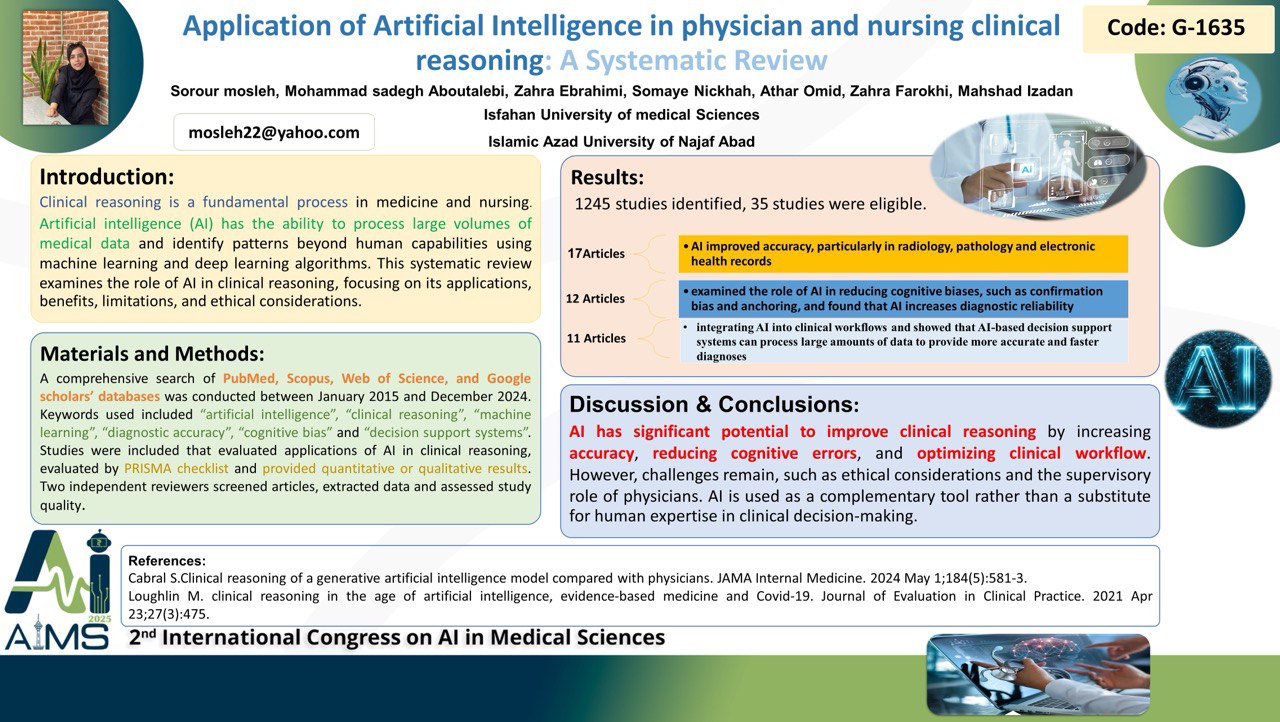Application of Artificial Intelligence in physician and nursing clinical reasoning: A Systematic Review
Code: G-1635
Authors: Zahra Farrokhi ℗, Sorour Mosleh *, Mohammad Sadegh Aboutalebi, Zahra Ebrahimi, Somaye Nickhah, Athar Omid, Mahshad Izadan7
Schedule: Not Scheduled!
Tag: Biomedical Signal Processing
Download: Download Poster
Abstract:
Abstract
Background and Aims: Clinical reasoning is a fundamental process in medicine and nursing that helps analyze patient data, make differential diagnoses, and formulate treatment plans. However, challenges such as cognitive biases and the large volume of medical information can lead to diagnostic errors. Artificial intelligence (AI) has the ability to process large volumes of medical data and identify patterns beyond human capabilities using machine learning and deep learning algorithms. This systematic review examines the role of AI in clinical reasoning, focusing on its applications, benefits, limitations, and ethical considerations. Methods: A comprehensive search of PubMed, Scopus, Web of Science, and Google scholars’ databases was conducted between January 2015 and December 2024. Keywords used included “artificial intelligence”, “clinical reasoning”, “machine learning”, “diagnostic accuracy”, “cognitive bias” and “decision support systems”. Studies were included that evaluated applications of AI in clinical reasoning, evaluated by PRISMA checklist and provided quantitative or qualitative results. Two independent reviewers screened articles, extracted data and assessed study quality. Results: 1245 studies identified, 35 studies were eligible. 17 studies showed that AI improved accuracy, particularly in radiology, pathology and electronic health records. Twelve studies examined the role of AI in reducing cognitive biases, such as confirmation bias and anchoring, and found that AI increases diagnostic reliability. Eleven studies looked at integrating AI into clinical workflows and showed that AI-based decision support systems can process large amounts of data to provide more accurate and faster diagnoses. However, eight studies addressed ethical and practical challenges, showing that AI can inherit biases from training data and that the “black box” problem in AI models reduces the transparency of decision-making. Seven studies examined the role of AI in medical education and highlighted the need to train physicians in adaptive expertise, critical thinking, and human-AI collaboration. Conclusion: AI has significant potential to improve clinical reasoning by increasing accuracy, reducing cognitive errors, and optimizing clinical workflow. However, challenges remain, such as ethical considerations and the supervisory role of physicians. AI is used as a complementary tool rather than a substitute for human expertise in clinical decision-making.
Keywords
Artificial Intelligence, Clinical Reasoning, Nursing, Physician
